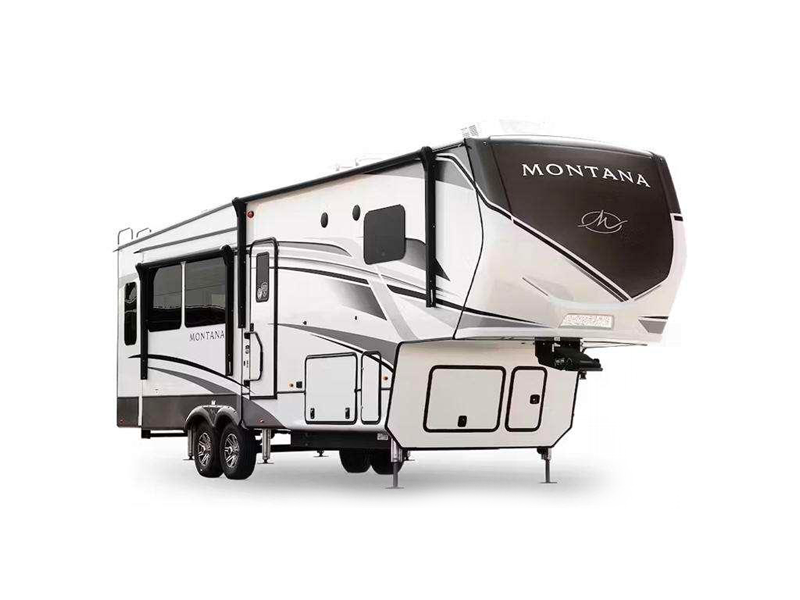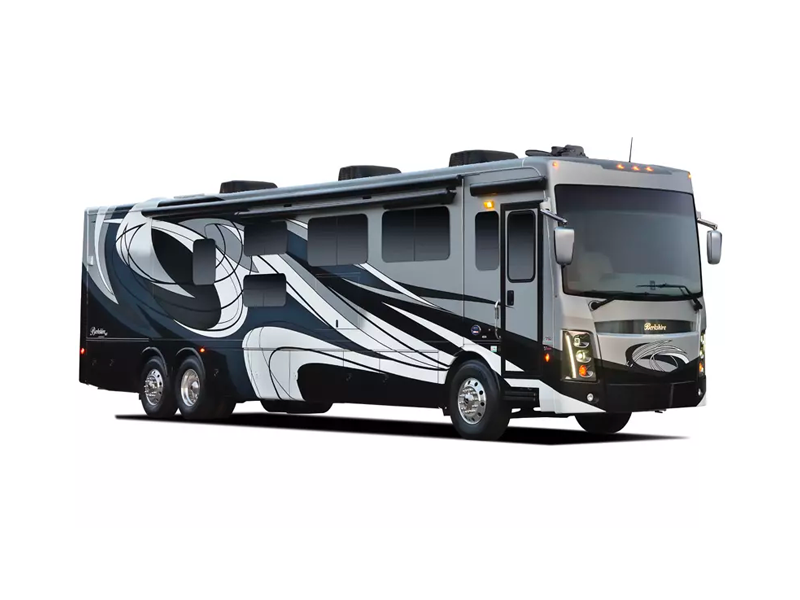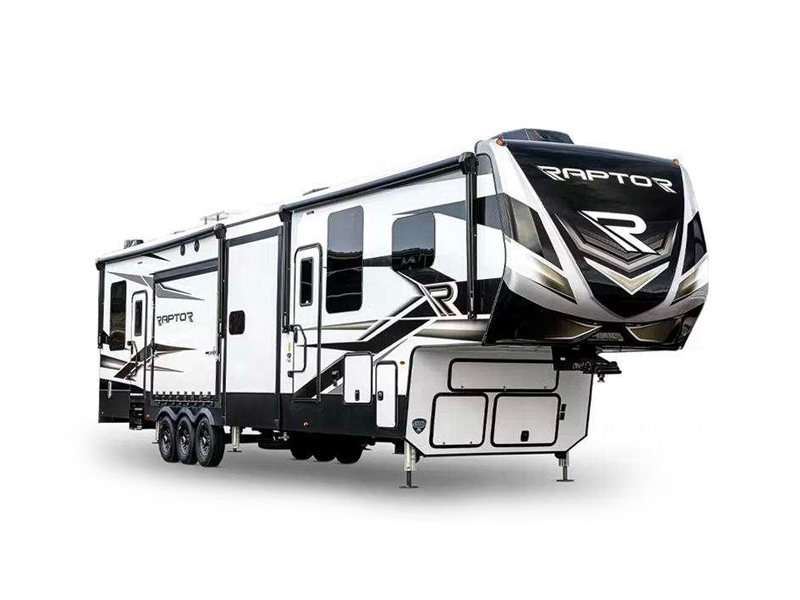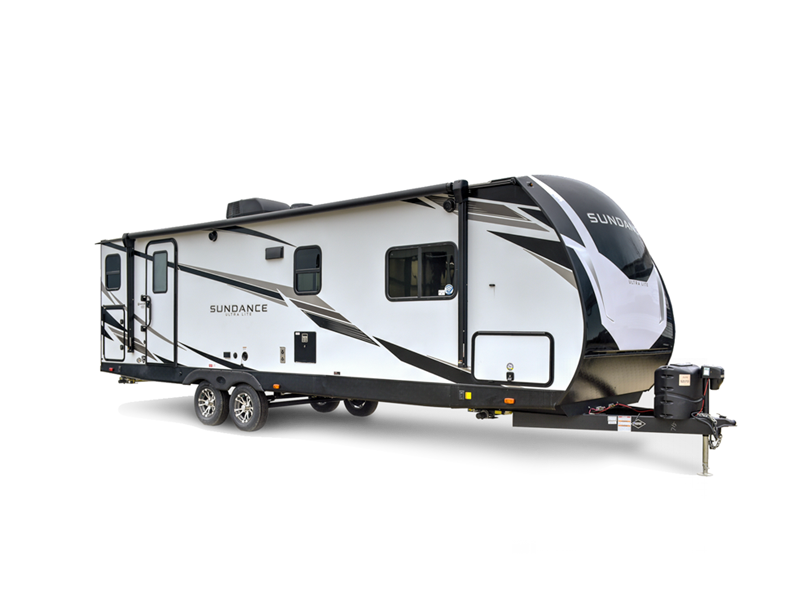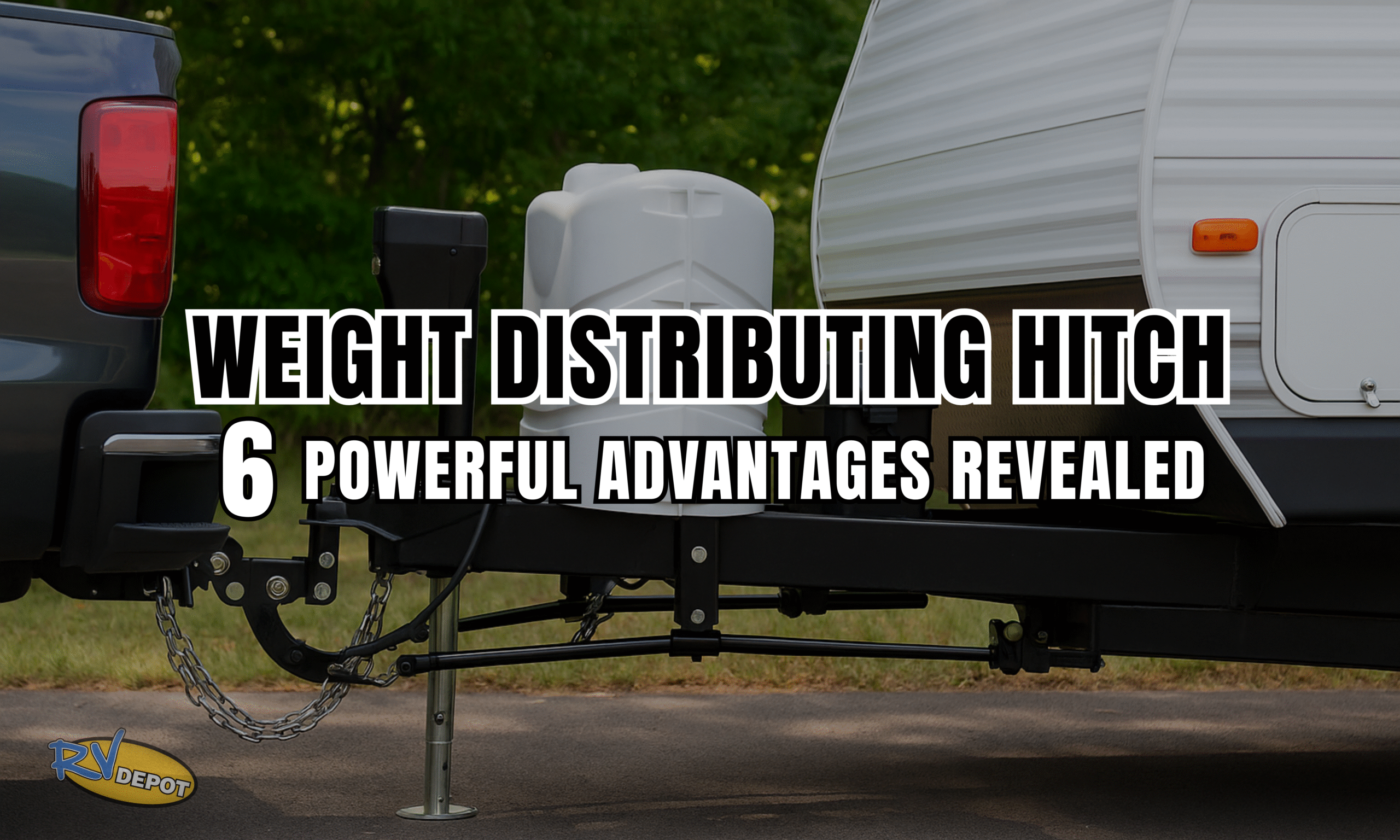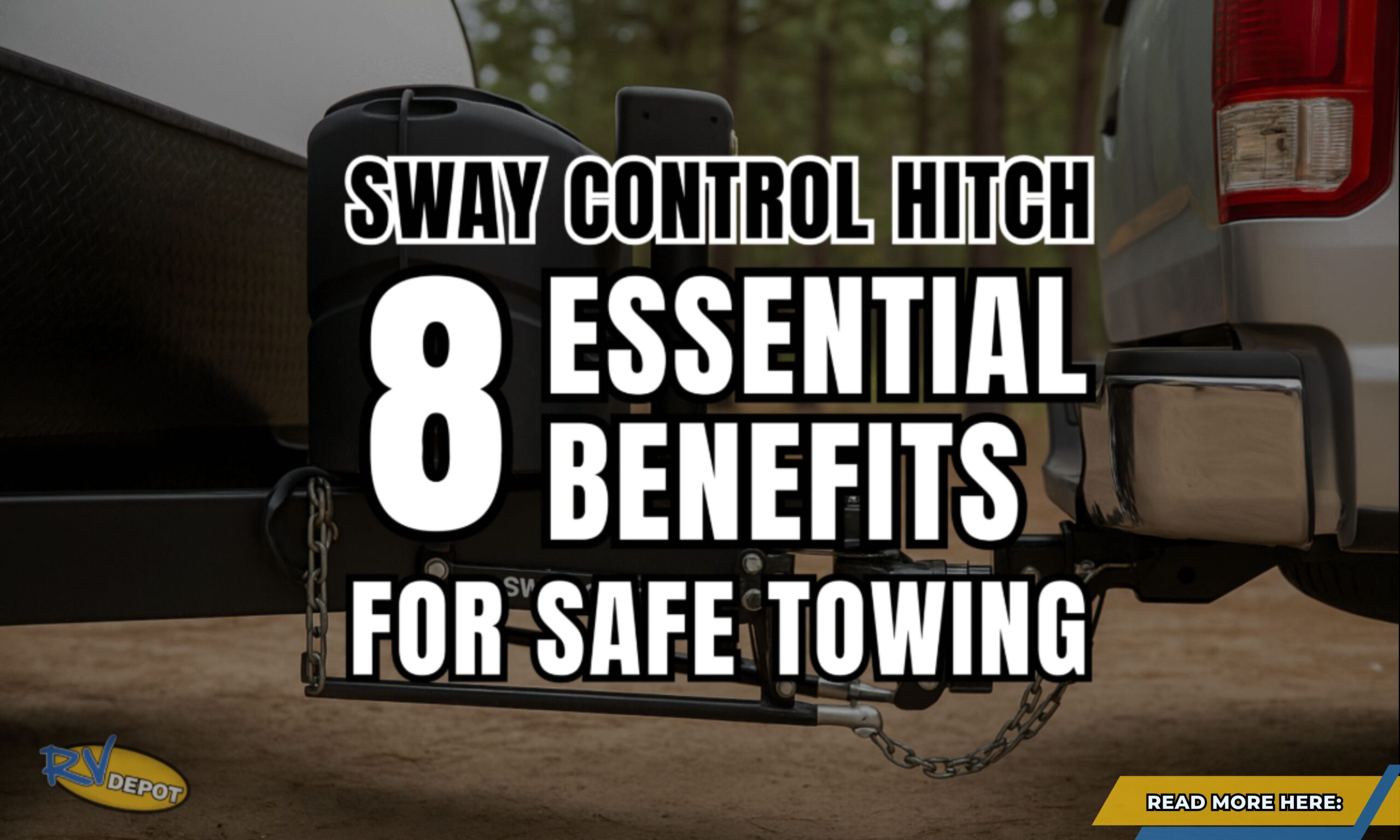Picture hooking up your 7,000-pound travel trailer and watching your truck’s front end lift so high that your headlights point skyward. This dangerous scenario illustrates exactly why a weight distributing hitch has become essential equipment for anyone towing substantial loads with their RV setup.
A weight distributing hitch transforms how weight transfers between your trailer and tow vehicle, redistributing tongue weight across all axles instead of concentrating it on your rear suspension. This redistribution creates dramatic improvements in handling, braking, and overall towing safety that standard ball hitches simply cannot provide.
Understanding how weight distributing hitch systems work and recognizing when you need one can mean the difference between a controlled, confident towing experience and struggling with a potentially dangerous setup that puts you and other drivers at risk.
The Science Behind Weight Distributing Hitch Systems

Understanding Weight Transfer Problems
When you connect a trailer to a standard ball hitch, all tongue weight transfers directly to your tow vehicle’s rear axle. This concentration of weight creates several serious problems that a weight distributing hitch specifically addresses.
Weight concentration effects include:
- Front axle unloading reduces steering control and braking
- Rear suspension compression affects handling and stability
- Altered vehicle geometry changes headlight aim and aerodynamics
- Uneven tire loading accelerates wear and reduces traction
For detailed technical standards on proper trailer loading and weight distribution, the Society of Automotive Engineers provides comprehensive guidelines. These industry standards validate the engineering principles behind weight distributing hitch technology and proper towing practices
How Weight Distribution Technology Works
A weight distributing hitch uses spring bars and leverage to redistribute tongue weight forward to the tow vehicle’s front axle and backward to the trailer’s axles. This redistribution restores proper weight balance across all wheels in your towing combination.
The physics involve creating opposing forces that counteract the tongue weight’s natural tendency to concentrate on the rear axle. Spring bars under tension pull down on the trailer tongue while simultaneously lifting the rear of the tow vehicle, effectively transferring weight forward and backward from the rear axle.
Types of Weight Distributing Hitch Systems
Traditional Spring Bar Systems

Round bar weight distributing hitch systems represent the most common and proven technology for weight redistribution. These systems use curved spring bars that store energy when loaded, creating the forces necessary for weight transfer.
Round bar system characteristics:
- Proven reliability through decades of use
- Simple adjustment through chain link positioning
- Cost-effective solution for most applications
- Wide compatibility with various trailer types
Installation involves:
- Head assembly bolts to your receiver hitch
- Spring bars connect between head and trailer brackets
- Chains provide adjustment for proper weight distribution
- Ball mount integrates with the head assembly
Trunnion Bar Systems
Trunnion-style weight distributing hitch systems use a different approach with removable bars that slide into the head assembly. These systems often provide easier setup and removal compared to traditional round bar systems.
Trunnion bar advantages:
- Tool-free removal of spring bars
- Easier backing with bars removed
- Compact storage when disconnected
- Precise adjustment through multiple settings
Integrated Sway Control Systems
Modern weight distributing hitch systems often integrate sway control technology directly into the weight distribution mechanism. These combination systems provide both weight redistribution and sway control in a single, coordinated system.
Integrated system benefits:
- Simplified setup with one system handling both functions
- Coordinated operation between weight distribution and sway control
- Reduced complexity compared to separate systems
- Optimized performance through integrated design
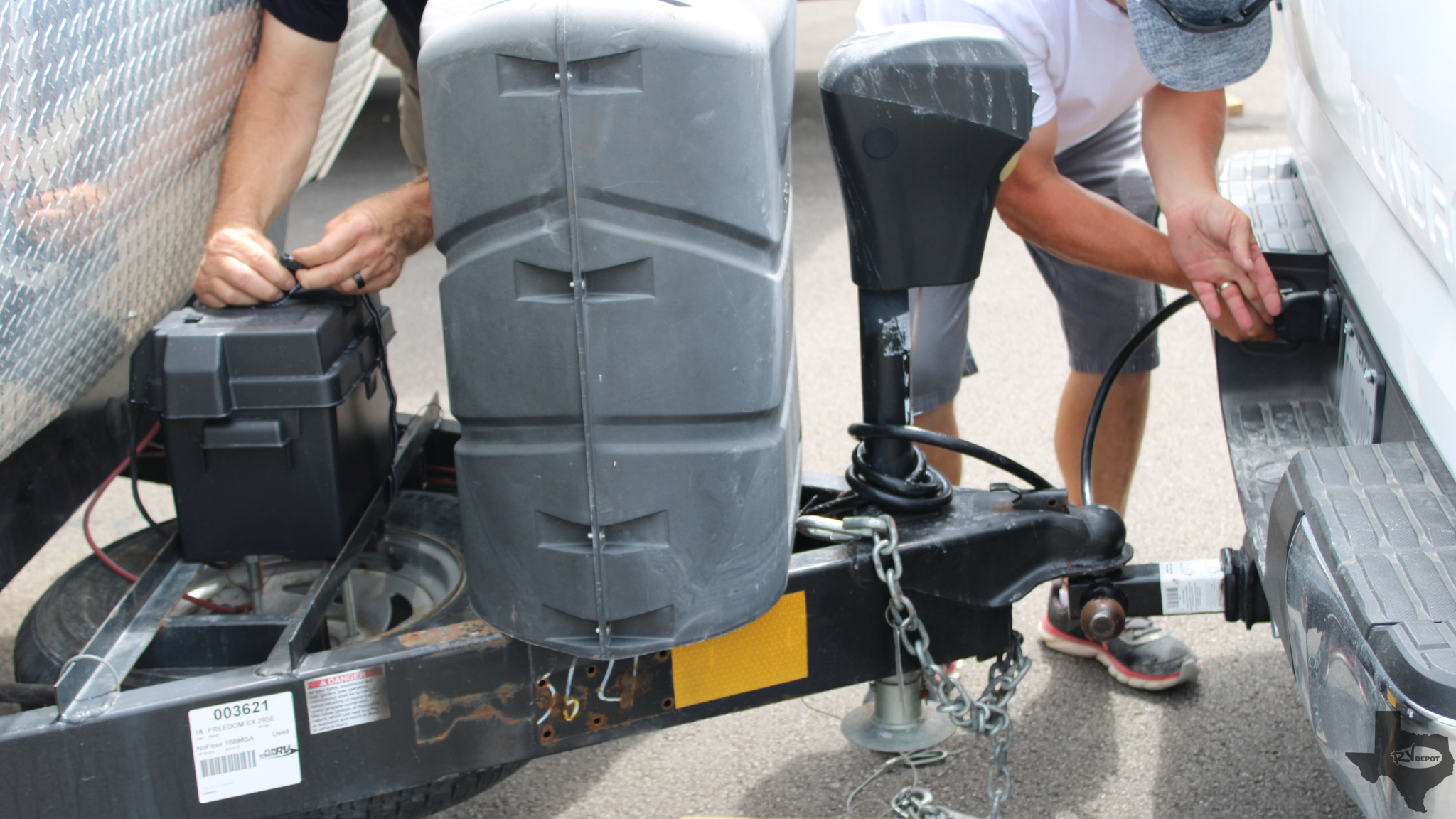
6 Powerful Advantages of Weight Distributing Hitch Systems
1. Dramatically Increased Towing Capacity
Most tow vehicle manufacturers specify higher towing weights when proper weight distributing hitch systems are used. This increase often ranges from 1,000 to 3,000 pounds, significantly expanding your trailer options.
Capacity increases result from:
- Better weight distribution across all axles
- Improved stability under maximum loads
- Enhanced braking capability through proper weight balance
- Reduced stress on individual components
| Vehicle Type | Standard Capacity | With Weight Distribution | Increase |
|---|---|---|---|
| Half-ton Pickup | 6,000-8,000 lbs | 8,000-11,000 lbs | 2,000-3,000 lbs |
| Three-quarter Ton | 10,000-12,000 lbs | 12,000-15,000 lbs | 2,000-3,000 lbs |
| Large SUV | 7,000-9,000 lbs | 9,000-11,000 lbs | 2,000 lbs |
2. Restored Vehicle Handling and Control
Proper weight distribution restores your tow vehicle’s designed handling characteristics by maintaining appropriate weight on the front axle. This restoration dramatically improves steering response, braking performance, and overall vehicle control.
Handling improvements include:
- Normal steering effort and response
- Balanced braking across all wheels
- Proper tire contact with road surface
- Maintained stability in crosswinds and traffic
3. Enhanced Safety Through Better Balance
Safety improvements from weight distributing hitch systems extend far beyond simple handling enhancements. Proper weight distribution affects every aspect of vehicle dynamics, from emergency maneuvers to routine highway driving.
Critical safety benefits:
- Improved emergency braking through balanced weight
- Better emergency steering response
- Reduced rollover risk through lower center of gravity
- Enhanced visibility from proper headlight aim
4. Extended Component Life
Concentrating tongue weight on rear axles creates premature wear on suspension components, tires, and steering systems. A weight distributing hitch eliminates this concentrated stress, extending component life across your entire towing combination.
Component protection includes:
- Reduced rear suspension stress and wear
- Even tire wear across all positions
- Extended brake life through balanced loading
- Less frame stress from concentrated loads
5. Improved Ride Quality and Comfort
Proper weight distribution eliminates the harsh, bouncy ride that results from overloaded rear suspension. Your weight distributing hitch restores normal suspension operation, providing comfortable rides for passengers and protecting cargo from excessive motion.
Comfort improvements:
- Smoother ride from properly functioning suspension
- Reduced noise from suspension bottoming
- Better stability reduces passenger fatigue
- Protected cargo from excessive bouncing
6. Legal Compliance and Insurance Benefits
Many states require weight distributing hitch systems for trailers exceeding certain weights or tongue weight percentages. Using proper equipment ensures legal compliance and may provide insurance benefits in case of accidents.
Compliance benefits:
- Legal operation in all states
- Insurance claim protection through proper equipment use
- DOT compliance for commercial applications
- Liability protection through responsible towing practices
Selecting the Right Weight Distributing Hitch
Capacity Requirements
Choose a weight distributing hitch rated for your trailer’s gross weight and tongue weight specifications. Undersized systems cannot provide proper weight distribution, while oversized systems may create handling problems.
Capacity selection guidelines:
- Gross trailer weight determines basic hitch rating
- Tongue weight capacity must exceed 10-15% of trailer weight
- Safety margin of 20% above actual weights recommended
- Growth accommodation for future trailer upgrades
Compatibility Considerations
Your weight distributing hitch must be compatible with your specific tow vehicle and trailer combination. Compatibility issues can affect performance, safety, and warranty coverage.
Critical compatibility factors:
- Receiver hitch rating must exceed weight distributing hitch capacity
- Frame strength adequate for transferred loads
- Clearance requirements for spring bar operation
- Electrical integration for brake controllers and lighting
Professional Installation Benefits
Professional installation ensures your weight distributing hitch operates safely and effectively. Improper installation can actually reduce safety rather than improve it.
Installation expertise includes:
- Proper height adjustment for level towing
- Correct spring bar tension for optimal weight transfer
- Electrical integration with vehicle systems
- Safety chain routing and adjustment
Common Weight Distributing Hitch Issues

Incorrect Adjustment
Most weight distributing hitch problems stem from improper adjustment rather than equipment deficiencies. Proper adjustment requires understanding how spring bar tension affects weight transfer.
Adjustment indicators:
- Level vehicle stance when loaded and hitched
- Equal tire pressure readings across all positions
- Proper headlight aim maintained when towing
- Balanced handling in normal driving conditions
Inadequate Maintenance
Weight distributing hitch systems require regular maintenance to operate safely and effectively. Neglected maintenance can lead to failure during critical situations.
Essential maintenance tasks:
- Lubrication of pivot points and wear surfaces
- Torque checking of all fasteners
- Inspection of spring bars for cracks or wear
- Electrical connection cleaning and protection
Overloading
Exceeding your weight distributing hitch capacity creates dangerous conditions that no amount of adjustment can correct. Always verify that your system rating exceeds your actual trailer weight with safety margin.
Installation and Setup Process
Pre-Installation Measurements
Successful weight distributing hitch installation begins with accurate measurements of your tow vehicle both loaded and unloaded. These measurements guide proper setup and verify correct operation.
Required measurements:
- Front and rear wheel well heights unloaded
- Same measurements with trailer connected using ball hitch only
- Target heights for proper weight distribution
- Tongue height for level towing setup
Professional Setup Procedures
Expert technicians follow specific procedures to ensure your weight distributing hitch operates optimally for your particular combination.
Setup process includes:
- Height adjustment for level towing attitude
- Spring bar tension calibration for proper weight transfer
- Sway control integration if equipped
- Test towing to verify proper operation
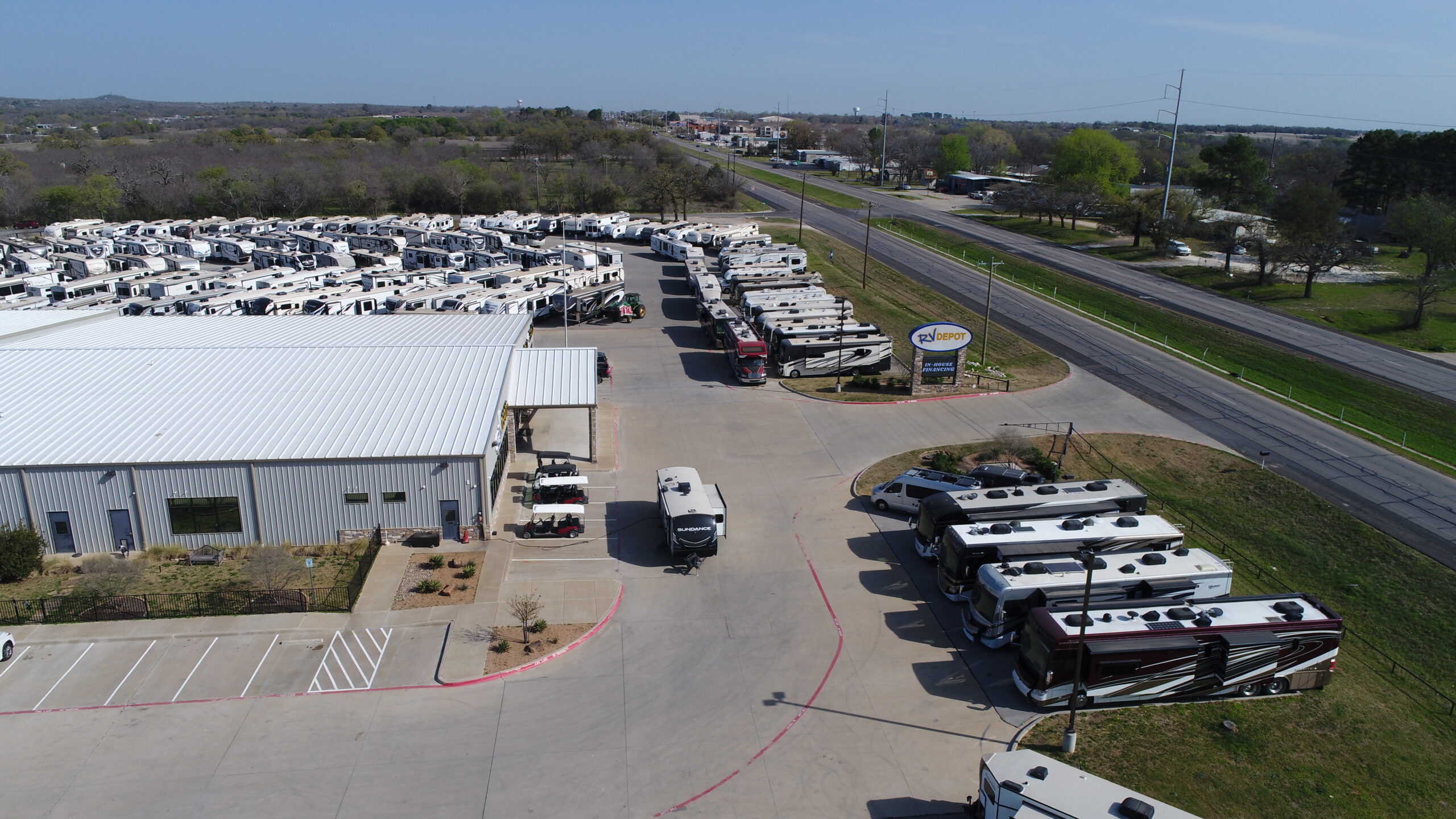
RV Depot’s Weight Distribution Expertise
At RV Depot in Cleburne, Texas, our 30+ years of experience with heavy-duty towing systems has shown us how dramatically a properly installed weight distributing hitch can transform a towing experience. We’ve witnessed countless customers go from struggling with unstable, dangerous towing combinations to confident, controlled travel through proper weight distribution.
Our comprehensive approach to weight distributing hitch solutions starts with analyzing your complete towing setup. We measure your actual vehicle and trailer weights, assess your typical loads, and evaluate your driving patterns to recommend the optimal weight distributing hitch system for your specific needs.
Professional installation and setup services ensure your weight distributing hitch operates exactly as designed from day one. Our certified technicians use precision measurement tools and follow manufacturer specifications to achieve optimal weight distribution for your specific combination.
Ongoing support includes maintenance guidance, adjustment assistance, and troubleshooting help whenever you need it. We believe weight distributing hitch systems require proper understanding and maintenance to provide the safety and performance benefits they’re designed to deliver.
Transform your towing experience with professional weight distributing hitch solutions from RV Depot. 📍 Visit: 4319 N. Main St, Cleburne, TX 76033 📱 Call or text: (817) 678-5133 💻 Browse Inventory: rvdepottx.com
Questions about full-time RV living? Join thousands of Texans who’ve discovered that home isn’t a place—it’s wherever you park it. Full-Time RV Living Community

